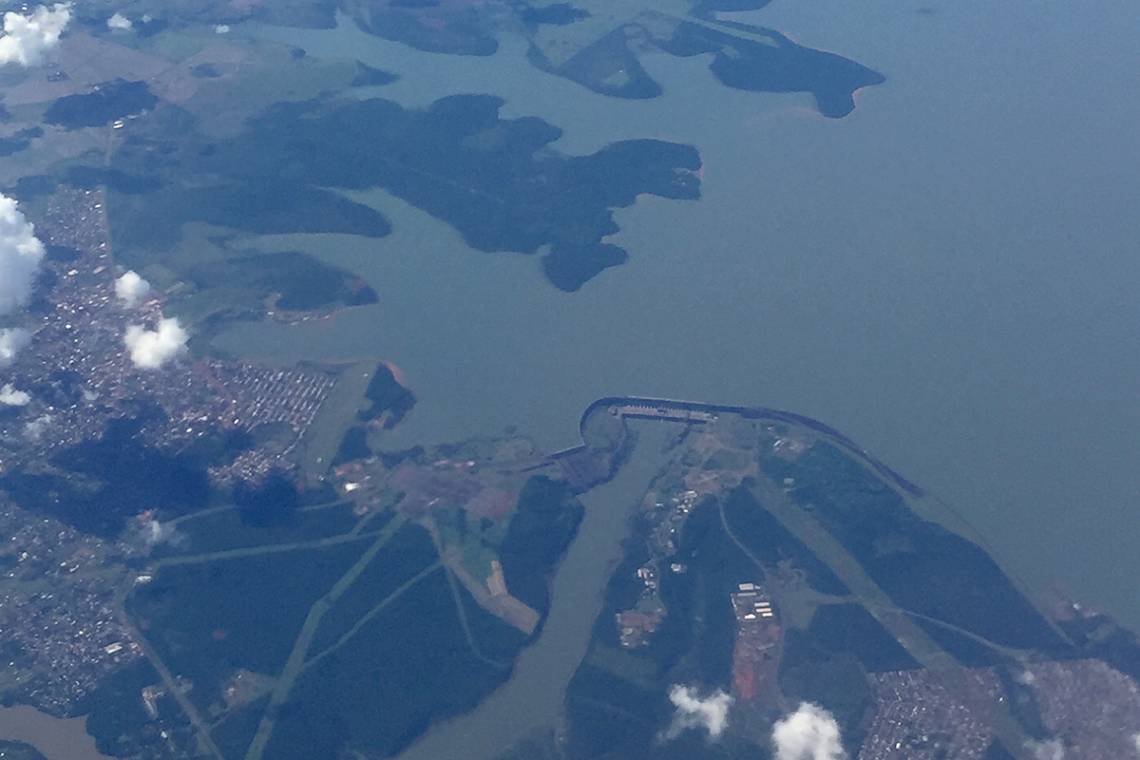
The Itaipú Binational Dam, located on the border of Paraguay and Brazil, currently generates about 80 percent of Paraguay’s energy and 20 percent of Brazil’s. In 2023, portions of the treaty that governs Itaipú – the world’s largest hydroelectric dam – will be renegotiated, with energy pricing and distribution agreements up for debate.
Christine Folch, assistant professor of cultural anthropology, has studied Itaipú since 2007 and is leading a team to develop non-partisan recommendations to inform Paraguay’s approach to the treaty renegotiation.
The team, collaborating closely with South American research colleagues, sees the renegotiation as an opportunity to advance sustainable development in Paraguay and Brazil.
“This is about more than the interests of Paraguay and Brazil,” notes Folch. “It’s about energy integration. Itaipú Dam is the single largest source of electricity, renewable or otherwise, in the world. And because South America is a world leader in renewable energy, Itaipú has global impact.”
In anticipation of the upcoming renegotiations, this June the Duke team will provide the Paraguayan public, government and energy sector with a two-pronged policy proposal:
- Renegotiation strategy recommendations for Itaipú Binational Dam based on legal-political analysis; and
- Recommendations for hydroelectric sector-based sustainable development.
Origins of the project
Last year, Folch gave a series of public talks in Paraguay on the results of her research on energy decision-making related to the dam’s current governance arrangements.
At a U.S. Embassy event packed with Paraguayan students, a young man raised his hand after Folch's talk on the past and future of the Itaipú Dam. "You've studied this," he said. "What do you think we should do next?"
"And it hit me," Folch recalls. "This issue really matters. I have the opportunity to draw on my research to address a question that is not at all hypothetical. My desire to answer that question well is grounded in the sacred trust that is created when communities invite researchers into their worlds.”

The Duke University Energy Initiative—an interdisciplinary hub for energy education, research and engagement across Duke’s schools—is helping advance the project.
“This is a remarkable opportunity to leverage the best of Duke to advance development of a natural resource governance approach that is based on consensus and can have long-term benefits for the people of Paraguay,” notes Brian Murray, interim director of the Energy Initiative. “The project offers Duke students and researchers the opportunity to work on a large-scale, real-world problem that touches energy, environment and public policy issues. Christine is relatively new to Duke, and our goal was to help her identify other faculty here who can make significant contributions to this important work.”
Faculty members involved with the project to date include Dalia Patino-Echeverri (Nicholas School of the Environment), Steven Sexton (Sanford School of Public Policy), Marc Jeuland (Sanford School of Public Policy), John French (History Department, Trinity College of Arts & Sciences), Esther Gabara (Romance Studies Department, Trinity College of Arts & Sciences), and Patrick Duddy (Center for Latin American and Caribbean Studies).
“We have engaged Duke students in this work too, giving them opportunities to apply research in truly impactful ways,” Folch explains. Odette Rouvet, a mid-career student in Duke’s Master of International Development Policy (MIDP) program, brings substantial experience as a legislative and policy analyst to the project.
Recent progress and what’s next
Earlier this spring, Folch and Rouvet visited Paraguay, where they met with Paraguayan and U.S. government officials, media, business and engineering leaders and energy experts, Itaipú Dam officials, and university students and faculty. They focused on gathering information, gauging stakeholders’ perspectives and publicizing the Duke team’s forthcoming recommendations.
In April, the Duke team hosted an international working group of energy and engineering researchers who collaborated on synthesizing information and drafting preliminary recommendations for Paraguay. Visiting researchers from the National University of Asunción included Gerardo Blanco, Victorio Oxilia, and Cecilia Llamosas.
Maria Antonia Gwynn, a fellow at Princeton’s Woodrow Wilson School of Public and International Affairs, also joined the working group at Duke. "The Itaipú treaty renegotiation in 2023 will be a tipping point for the sustainable development of Paraguay," she said.
In June, members of the Duke team will visit South America again to present a preliminary policy brief to the Paraguayan Congress and regional governments—a draft document that can be refined and iterated upon over the next few years with feedback from Paraguayan stakeholders.
The Energy Initiative recently awarded Folch’s team an Energy Research Seed Fund grant to support this work.
“Brazil has had teams of experts preparing for treaty negotiations for years. As a smaller country, Paraguay has fewer resources to devote to the issue,” Folch said. “All parties involved in the negotiation of this critical energy source need to come to the table with a strong understanding of the long-term environmental, political and social implications of the treaty--and awareness of what the public thinks of these matters.”
Public conversation will be critical, Folch said. “Our team at Duke is trying to advance that conversation in Paraguay, sharing ideas and information that can be used to explore solutions, build consensus, and develop the capacity of the Paraguayan people to make the most of this crucial natural resource.”